Blue Diamond
Things to do this month | October

- Remove blinds and shade paint from greenhouses so that overwintering plants get as much light as possible.
- Clean and disinfect greenhouses.
- Clean and disinfect greenhouses.
- Tidy up beds and borders, clearing away dead and dying leaves.
- Rake up fallen leaves and collect them to make leafmould
- Net ponds to stop leaves falling in.
- Clear ponds of excess pond weed and blanket weed.
- Put pots on pot feet to avoid them getting waterlogged in winter.
- Put up a bird feeder to support your garden birds through the winter months.
- Take cuttings from deciduous shrubs.

- Prune climbing roses once they have finished flowering.
- Cut tall bush roses back by a third to avoid windrock.
- Clear up fallen rose leaves and dispose of them to stop the spread of black spot.
- Clean garden furniture before you store it away for the winter.
- Give the barbecue a thorough cleaning before putting it away for the winter.
- Feed wild birds with high-energy bird foods to help them through the autumn and winter.
- When water temperatures drop below 21°C (70F), feed fish with easier-to-digest, wheat germ foods.
- Give tools a thorough clean before you put them away for winter.
- Slugs and snails may become more active in cooler, damper weather – so protect plants with suitable controls.
- As perennial weeds start to die back, this is a good time to give them a final application of weedkiller.
